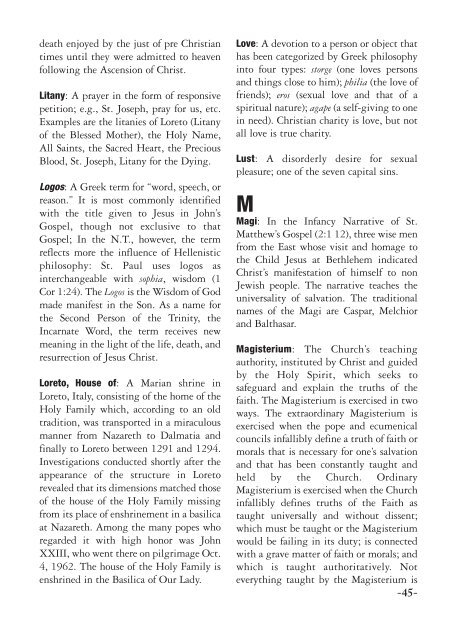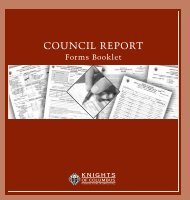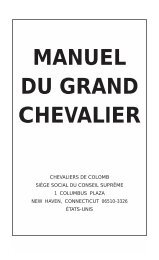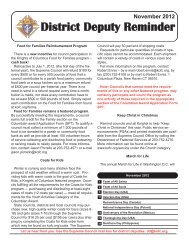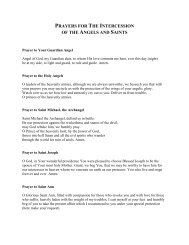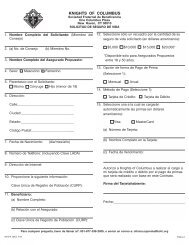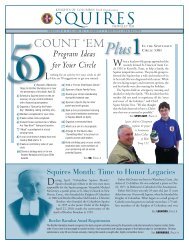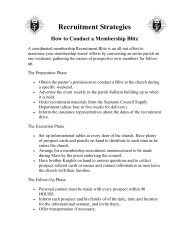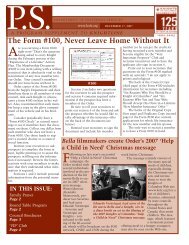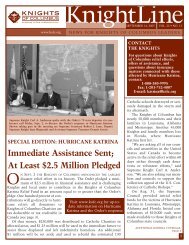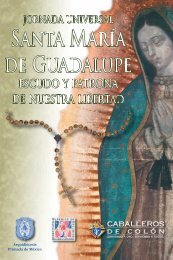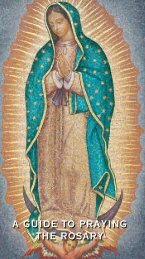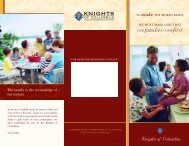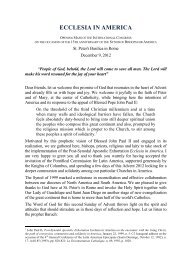CATHOLIC WORD BOOK - Knights of Columbus, Supreme Council
CATHOLIC WORD BOOK - Knights of Columbus, Supreme Council
CATHOLIC WORD BOOK - Knights of Columbus, Supreme Council
Create successful ePaper yourself
Turn your PDF publications into a flip-book with our unique Google optimized e-Paper software.
death enjoyed by the just <strong>of</strong> pre Christian<br />
times until they were admitted to heaven<br />
following the Ascension <strong>of</strong> Christ.<br />
Litany: A prayer in the form <strong>of</strong> responsive<br />
petition; e.g., St. Joseph, pray for us, etc.<br />
Examples are the litanies <strong>of</strong> Loreto (Litany<br />
<strong>of</strong> the Blessed Mother), the Holy Name,<br />
All Saints, the Sacred Heart, the Precious<br />
Blood, St. Joseph, Litany for the Dying.<br />
Logos: A Greek term for “word, speech, or<br />
reason.” It is most commonly identified<br />
with the title given to Jesus in John’s<br />
Gospel, though not exclusive to that<br />
Gospel; In the N.T., however, the term<br />
reflects more the influence <strong>of</strong> Hellenistic<br />
philosophy: St. Paul uses logos as<br />
interchangeable with sophia, wisdom (1<br />
Cor 1:24). The Logos is the Wisdom <strong>of</strong> God<br />
made manifest in the Son. As a name for<br />
the Second Person <strong>of</strong> the Trinity, the<br />
Incarnate Word, the term receives new<br />
meaning in the light <strong>of</strong> the life, death, and<br />
resurrection <strong>of</strong> Jesus Christ.<br />
Loreto, House <strong>of</strong>: A Marian shrine in<br />
Loreto, Italy, consisting <strong>of</strong> the home <strong>of</strong> the<br />
Holy Family which, according to an old<br />
tradition, was transported in a miraculous<br />
manner from Nazareth to Dalmatia and<br />
finally to Loreto between 1291 and 1294.<br />
Investigations conducted shortly after the<br />
appearance <strong>of</strong> the structure in Loreto<br />
revealed that its dimensions matched those<br />
<strong>of</strong> the house <strong>of</strong> the Holy Family missing<br />
from its place <strong>of</strong> enshrinement in a basilica<br />
at Nazareth. Among the many popes who<br />
regarded it with high honor was John<br />
XXIII, who went there on pilgrimage Oct.<br />
4, 1962. The house <strong>of</strong> the Holy Family is<br />
enshrined in the Basilica <strong>of</strong> Our Lady.<br />
Love: A devotion to a person or object that<br />
has been categorized by Greek philosophy<br />
into four types: storge (one loves persons<br />
and things close to him); philia (the love <strong>of</strong><br />
friends); eros (sexual love and that <strong>of</strong> a<br />
spiritual nature); agape (a self-giving to one<br />
in need). Christian charity is love, but not<br />
all love is true charity.<br />
Lust: A disorderly desire for sexual<br />
pleasure; one <strong>of</strong> the seven capital sins.<br />
M<br />
Magi: In the Infancy Narrative <strong>of</strong> St.<br />
Matthew’s Gospel (2:1 12), three wise men<br />
from the East whose visit and homage to<br />
the Child Jesus at Bethlehem indicated<br />
Christ’s manifestation <strong>of</strong> himself to non<br />
Jewish people. The narrative teaches the<br />
universality <strong>of</strong> salvation. The traditional<br />
names <strong>of</strong> the Magi are Caspar, Melchior<br />
and Balthasar.<br />
Magisterium: The Church’s teaching<br />
authority, instituted by Christ and guided<br />
by the Holy Spirit, which seeks to<br />
safeguard and explain the truths <strong>of</strong> the<br />
faith. The Magisterium is exercised in two<br />
ways. The extraordinary Magisterium is<br />
exercised when the pope and ecumenical<br />
councils infallibly define a truth <strong>of</strong> faith or<br />
morals that is necessary for one’s salvation<br />
and that has been constantly taught and<br />
held by the Church. Ordinary<br />
Magisterium is exercised when the Church<br />
infallibly defines truths <strong>of</strong> the Faith as<br />
taught universally and without dissent;<br />
which must be taught or the Magisterium<br />
would be failing in its duty; is connected<br />
with a grave matter <strong>of</strong> faith or morals; and<br />
which is taught authoritatively. Not<br />
everything taught by the Magisterium is<br />
-45-


